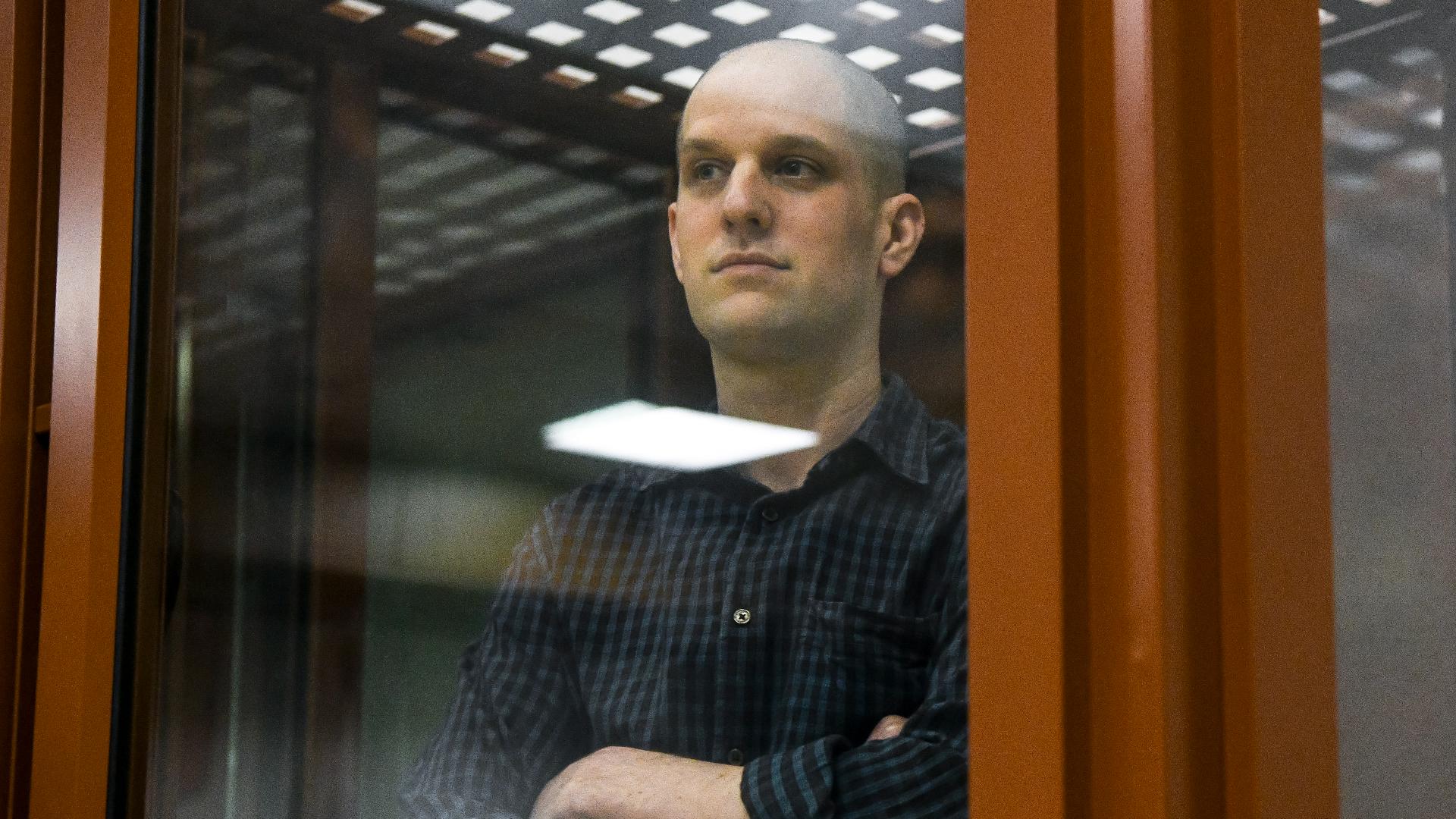YEKATERINBURG, Russia — Wall Street Journal reporter Evan Gershkovich was convicted Friday of espionage and sentenced to 16 years on charges that his employer and the U.S. have rejected as fabricated.
The conclusion of his swift and secretive trial in the country’s highly politicized legal system perhaps cleared the way for a prisoner swap between Moscow and Washington.
When the judge in the Sverdlovsk Regional Court asked Gershkovich if he understood the verdict, he said yes.
Gershkovich, 32, was detained in March 2023 while on a reporting trip to the Ural Mountains city of Yekaterinburg and accused of spying for the U.S., and has been behind bars ever since.
He was the first U.S. journalist taken into custody on espionage charges since Nicholas Daniloff in 1986, at the height of the Cold War. Gershkovich’s arrest shocked foreign journalists in Russia, even though the country has enacted increasingly repressive laws on freedom of speech after sending troops into Ukraine.
Closing arguments took place behind closed doors at the trial, where Gershkovich did not admit any guilt, according to the court's press service.
Gershkovich, 32, was arrested March 29, 2023, while on a reporting trip to the Ural Mountains city of Yekaterinburg. Authorities claimed, without offering any evidence, that he was gathering secret information for the U.S. — the first American journalist to be accused of espionage since the Cold War.
Gershkovich was in court for a second straight day Friday for the closed proceedings, where officials said prosecutors requested an 18-year sentence in a high-security prison.
Unlike the trial's opening on June 26 in Yekaterinburg and previous hearings in Moscow in which reporters were allowed to see Gershkovich briefly before sessions began, there was no access to the courtroom on Thursday, but media was allowed in the court on Friday for the verdict. Espionage and treason cases are typically shrouded in secrecy.
Russian courts convict more than 99% of defendants, and prosecutors can appeal sentences that they regard as too lenient. They even can appeal acquittals.
“Evan’s wrongful detention has been an outrage since his unjust arrest 477 days ago, and it must end now,” the Journal said Thursday in a statement. “Even as Russia orchestrates its shameful sham trial, we continue to do everything we can to push for Evan’s immediate release and to state unequivocally: Evan was doing his job as a journalist, and journalism is not a crime. Bring him home now.”
The U.S. State Department has declared Gershkovich “wrongfully detained,” committing the government to assertively seek his release.
Asked Friday about a possible prisoner swap involving Gershkovich, Kremlin spokesman Dmitry Peskov refused to comment.
Russian Foreign Minister Sergey Lavrov said Wednesday at the United Nations that Moscow and Washington’s “special services” are discussing an exchange involving Gershkovich. Russia has previously signaled the possibility of a swap, but it says a verdict would have to come first. Even after a verdict, any such deal could take months or years.
State Department deputy spokesman Vedant Patel on Thursday declined to discuss negotiations about a possible exchange, but said: “We have been clear from the get-go that Evan did nothing wrong and should not have been detained. To date, Russia has provided no evidence of a crime and has failed to justify Evan’s continued detention.”
Russian President Vladimir Putin hinted earlier this year that he would be open to swapping Gershkovich for Vadim Krasikov, a Russian serving a life sentence for the 2019 killing in Berlin of a Georgian citizen of Chechen descent.
Gershkovich has spent about 15 months in Moscow’s notorious Lefortovo Prison.
The Russian Prosecutor General’s office said last month the journalist is accused of “gathering secret information” on orders from the CIA about Uralvagonzavod, a plant about 150 kilometers (90 miles) north of Yekaterinburg that produces and repairs tanks and other military equipment.
Lavrov on Wednesday reaffirmed the Kremlin claim that the government has “irrefutable evidence” against Gershkovich, although neither he nor any other Russian official has ever disclosed it.
Gershkovich’s employer and U.S. officials have dismissed the charges as bogus.
“Evan has never been employed by the United States government. Evan is not a spy. Journalism is not a crime. And Evan should never have been detained in the first place,” White House national security spokesperson John Kirby said last month.
Russia’s interpretation of what constitutes high crimes like espionage and treason is broad, with authorities often going after people who share publicly available information with foreigners and accusing them of divulging state secrets.
Earlier this month, U.N. human rights experts said Russia violated international law by jailing Gershkovich and should release him “immediately.”
Arrests of Americans are increasingly common in Russia, with nine U.S. citizens known to be detained there as tensions between the two countries have escalated over fighting in Ukraine.
U.S. Ambassador to the U.N., Linda Thomas-Greenfield accused Moscow of treating “human beings as bargaining chips.” She singled out Gershkovich and ex-Marine Paul Whelan, 53, a corporate security director from Michigan, who is serving a 16-year sentence after being convicted on spying charges that he and the U.S. denied.

